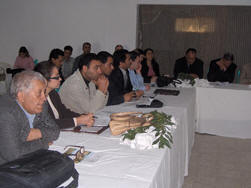In
this issue:
The INECO
Approach in IWRM
Overview of the INECO Case Studies
Problem Analysis in the Damour River Basin, Lebanon
Major INECO events during the first year of the project
INECO Stakeholder workshop in Tunisia
Stakeholder consultation in Lebanon
The Egypt Women Awareness Symposium
The 1st semester Deliverables of INECO
Future
project events
The INECO Consortium |
|
The Tunisia Local
Stakeholder Workshop |
|
The INECO Tunisia Partner CITET
organized a local workshop for stakeholders and
end-users, in Nabeul (60km south of Tunis) on May 8th 2007, in the
framework of INECO. The objective of the
workshop was to discuss and exchange opinions on the focal water management
problem of aquifer depletion. The workshop
brought together 46 participants, including of 15 secondary stakeholders, 13 technicians,
5 farmers, 12 representatives of Agriculture Development Groups (GDA), and 1
Media representative. The opening and closing sessions were presided by Mr. Sadok Amara: General
Secretary of Nabeul Coordination Committee of the governing party of Tunisia (RCD),
and moderated by Mr. Belgacem Hanchi, General Director of CITET.
|
The workshop included four (4)
presentations:
-
Sustainable Management and Governing Water resources in Nabeul region by
Mr. Mongi Souilem, Deputy Director at the Regional Agriculture Development: CRDA
of Nabeul.
-
Exploitation of ground water resources in Nabeul region by Mr. Fayšal Jlassi,
deputy director at CRDA of Nabeul.
-
Recharge of ground water tables and water
reuse by Mr. Moncef Rekaya, Director at CRDA of Nabeul.
-
The INECO project and Focal problem analysis by Mr. Ahmed Bouzid, Consultant and
project manager at CITET.
|
|
 |
 |
|
|
|
Different points were raised by 14 participants in the discussion session that
followed, including:
|
-
Improving awareness of farmers
-
Recharge of water tables and water mobilization
-
Scientific research
-
Sea intrusion
-
Human and financial means of Agriculture Development Groups (GDA)
-
Infrastructure
|
|
|
|
The main recommendations of the workshop were:
-
Efficiently manage water valves of surface water resources (40% are actually used
only)
-
Monitor the exploitation of groundwater resources, by
installing meters on wells boreholes
-
Equip irrigated perimeters with appropriate equipment for drip irrigation
-
Establish a monitoring system to control treated waste water quality before
the recharge.
-
Unify water tariffs
-
Manage water tables by participatory and
collaborative management
-
Create a management organization for promoting aquifer recharge
-
Elaborate a study on the participatory management of water tables
-
Upgrade, consolidate and reinforce the
Agriculture Development Groups (GDA)
|
-
Reinforce extension and awareness of end-users on water
conservation methods, exploitation of mobilized
resources, and water reuse
-
Reinforce soil conservation and water mobilization works (actually 500
hm3 are lost as run-off to the sea)
-
Bring scientific research results near “GDA”
-
Apply the regional Agricultural map
-
Give more attention to pilot irrigation schemes and water
valorisation at the economic level
-
Increase farmers interest vis–a–vis collective management.
-
Inter-basin transfer from the north should be made
only for sustaining and safeguarding existing public irrigated perimeters than creating new
ones
-
It would be preferable if the INECO project focuses on one irrigated perimeter,
rather than the whole region
of Nabeul
|
|
|
|
On water governance issues, irrigated water resources management
(organisational and institutional measures, technical tools) and participatory
management of water tables (through GDA’s) are 2 important aspects which
need further consideration. Therefore, they constitute future themes for the region in order to preserve
water resources (implementation of clear management rules, reinforcing capacity
building of GDA’s). |
In conclusion, two main ideas emerged from the workshop:
-
Management of water table devices.
-
Participatory management of water tables.
|
|
Participants List
Full Workshop Report in French
Full Workshop Report in Arabic
|
|
 |
|



